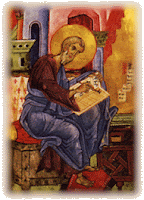Welcome to Early Church Keyline Blog 2023--the Official Blog of History 424, Early Church History.
To get started, here's a test of the History 424 blog system. If you don't already have one, you might want to set up a Google/Blogger account. If you use a Google profile, it's easier for me to reply to your posts, something I occasionally do. You also might want to make yourself a follower to this blog.
If you prefer, you can post as an anonymous blogger. However, if you choose that option, you need to add your name to the bottom of the post so I know who to give credit to.
When you have created your blogger account and your profile, click the "comments" link below, and answer one (1) of the following questions:
1. Would you rather make comments on a blog, or write a term paper?
2. Which figure or book from the New Testament interests you the most, and why?
3. Why do you think the study of Early Church history is important--or not so important?
After you have done your own blog post, please reply to at least one other student's post.
 Please read Chapters 1-11 of John's gospel, concentrating on the first four chapters. Cite one thing John includes that *isn't* in the synoptic gospels (Matthew, Mark, and Luke).
Please read Chapters 1-11 of John's gospel, concentrating on the first four chapters. Cite one thing John includes that *isn't* in the synoptic gospels (Matthew, Mark, and Luke). 







